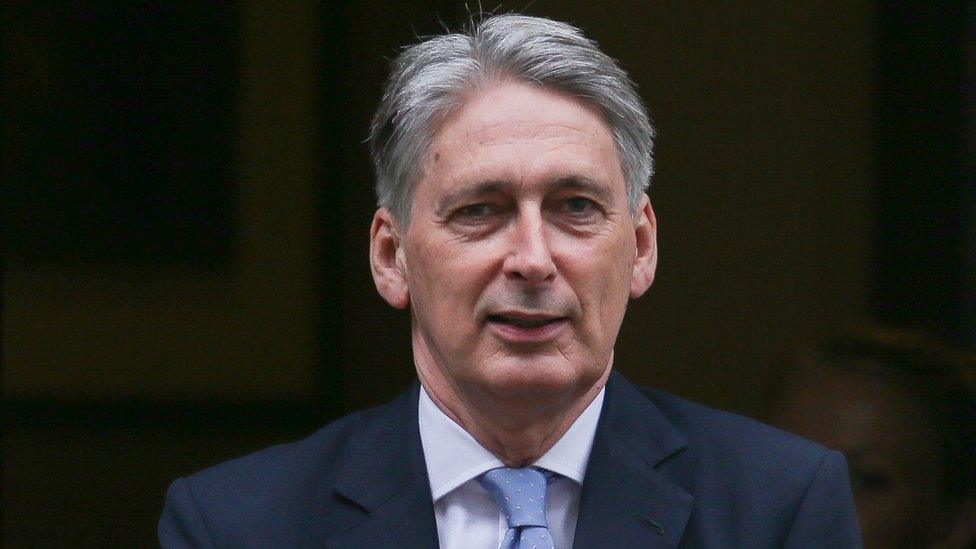Hammond’s public sector pay challenge
- Published
- comments

The Treasury jealously guards its role as keeper of the public purse.
And far from the mood since the general election easing on the matter of "sound money", the word among senior figures in the department is that now is the time "to hold our nerve".
Sources close to the chancellor point out that plans to balance the books - meaning that the government only spends as much as it receives in revenues, mostly in taxes - have already been delayed three times since 2010.
The present target is for the deficit - that difference between government income and expenditure - to be eliminated by 2025.
Philip Hammond wants to maintain that plan.
He sticks to a pretty well-known script when asked about increasing public spending.
Government wealth, he says, comes from three main areas.
The first is taxes - which, it is pointed out, the chancellor tried to increase in March, only for plans to raise national insurance contributions to be abandoned when it was revealed that it breached the Conservatives' 2015 manifesto pledge not to increase income tax, national insurance or VAT.
Is increasing taxes any more palatable now?
Second, borrowing - which the chancellor makes clear means increasing the amount of money that needs to be paid back by future generations.
And, finally, an increase in the ability of the economy to create wealth - called productivity.
It is this last area that is the most important and, conversely, the least open to direct government intervention.
The Treasury - as much as it might want to - cannot simply demand that the private and public sector becomes more efficient at delivering goods and services.
It takes time, money and training in skills - none of which the UK has a particularly proud tradition in.
And anything that is done by the government - such as increasing investment in infrastructure projects like digital broadband or new railway links - takes a long time to feed through to stronger wealth creation, higher economic growth and higher government tax receipts.
It is in within such classically "Treasury" parameters that Mr Hammond would like to see the present debate on increasing public spending considered.
Today, pressure is growing from Cabinet ministers such as Boris Johnson and Michael Gove for the government to relax its approach to the public sector pay cap, as my colleague Iain Watson reports.
The Institute for Fiscal Studies estimates that every 1% increase in public sector pay would cost between £1.5 and £2bn a year.
A pay rise for more than five million public sector workers who have seen their real incomes squeezed in the majority of years since the financial crisis is not cost-free.
And private sector workers on average still earn 3% to 4% less than public sector workers - although their wages are now rising more rapidly and the gap is closing.
Two of the major pay review bodies - for the NHS and for schools - have reported increasing problems of recruitment and retention in their sectors.
That warning is likely to be repeated by the schools review body when it reports later this month.
Last July, it said: "If current recruitment and retention trends continue, we expect an uplift to the pay framework significantly higher than 1% will be required to ensure an adequate supply of good teachers for schools in England and Wales."
The police pay review body, also expected to report imminently, sees fewer pressures.
"The general picture on officer recruitment and retention remains healthy," it said last year.
"There are also no issues on the quality of applicants, the number of joiners is meeting requirements and attrition rates are stable."
It does, however, say that "motivation and morale" remain a problem.
The Treasury knows it is in a difficult position - and must be heaving a sigh of relief that the health service pay review body is not due to report until next spring.
Abandoning the pay cap would certainly go some way to alleviating the standard-of-living squeeze felt by so many people.
And would be politically popular for a lot of people.
But Mr Hammond will have plenty of other pleas for increased funding to listen to.
What spending demands might flow from the Grenfell fire tragedy?
Should teachers' pay be increased, or is it more important to focus on raising per-pupil funding?
Tackling both adds to the bill which someone - the Treasury argues - has to pay now, through higher taxes, in the future, through higher borrowing or via further cuts elsewhere.
Such trade-offs are the stuff of politics - and the stuff of Budgets, the next of which is not due until November.
Mr Hammond might prefer a period of silence from colleagues on spending commitments until then.
But, with Parliament finely balanced and a prime minister relying on the good will of others to keep her in power, he knows he is not going to get it.
- Published27 June 2017
- Published26 June 2017
